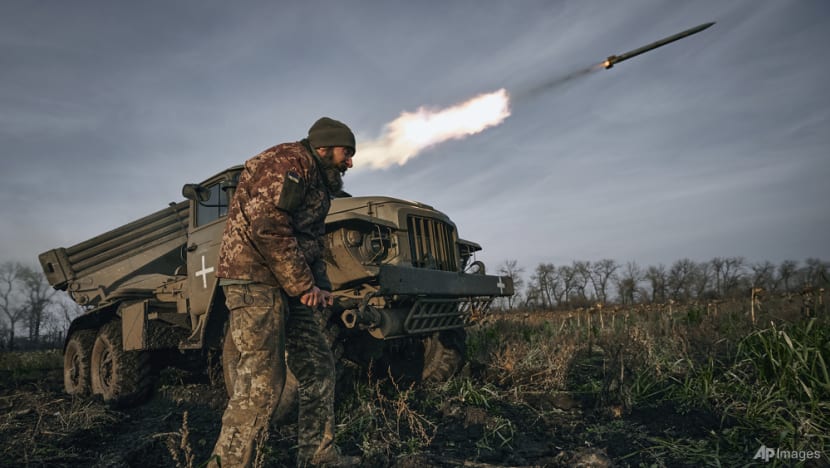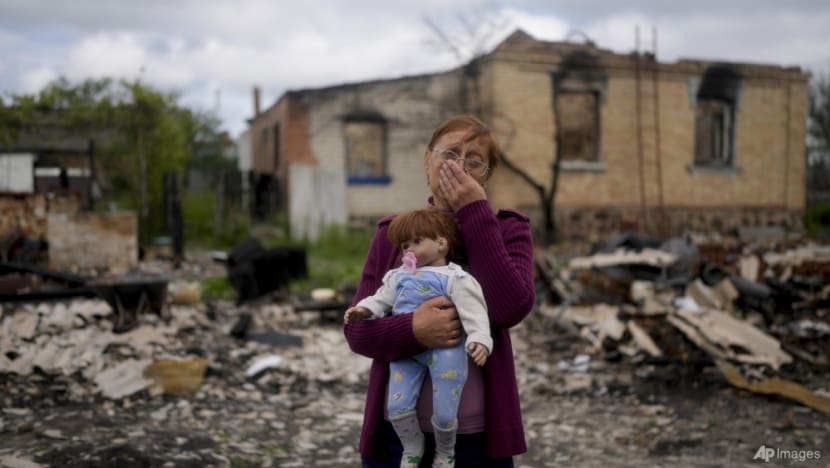‘Messy peace’ or total victory: Russia, Ukraine need to pick their battles as war drags on, say analysts
Geopolitics is “a very cruel business”, said one observer, adding that it is never the case where right is on one side and wrong is on the other.

Russia and Ukraine have to consider a "messy peace", or risk having more damage and deaths in a drawn-out war with no clear end in sight, said observers.
The two warring sides can reach a compromise if they want to, stressed Professor Kishore Mahbubani, Asian Peace Programme coordinator at the National University of Singapore’s Asia Research Institute. “It's not something theoretical, it can be done.”
However, both sides have to negotiate and find a solution - no matter how messy it could be - where Ukraine’s territorial sovereignty is protected and Russia does not see the country as a threat, observers told CNA.
GEOPOLITICS IS ‘A VERY CRUEL BUSINESS’
Geopolitics is “a very cruel business”, said Prof Mahbubani. “I've studied this geopolitics for over 50 years, it is never the case that one side is all right and the other side is completely wrong. Such black and white views of geopolitical issues are mythical.”
This comes as Russia’s invasion of Ukraine approaches the one-year mark on Friday (Feb 24). On this day last year, Russian President Vladimir Putin launched his "special military operation" in Ukraine.

Currently, the western countries are trying to help Ukraine “in order to give them a better position in a future negotiation”, said Mr James Crabtree, executive director of the International Institute for Strategic Studies-Asia.
“They don't really believe that Ukraine is going to be able to win a brilliant military victory in which they kick the Russians out of eastern Ukraine and Crimea. So I think some kind of negotiated peace is going to be necessary but really, ultimately, that has to be negotiated between Russia and the United States and Ukraine.”
TENSIONS BETWEEN UNITED STATES, CHINA
Meanwhile, Russia’s war with Ukraine has forced global superpowers China and the United States to pick sides.
The big geopolitical contest is between the US and China, pointed out Prof Mahbubani, adding that the war between Russia and Ukraine “is a sideshow”.
“The United States has made it very clear that if China steps into the conflict and supports Russia militarily, then of course the United States is going to get very upset,” he added.
“But frankly, there's no reason for China to step in and to help Russia. But if China can play the role of a peacemaker, and try and find ways of bringing peace to Ukraine, then I can tell you that most countries in the world welcome this.”
Mr Daniel Russel, vice president for international security and diplomacy at the Asia Society Policy Institute, said the war has a “huge and a negative impact on US-China ties, and therefore on the Asia-Pacific region”.
Mr Russel, a former United States Assistant Secretary of State for East Asian and Pacific Affairs, believes the Chinese leadership and its military are finding lessons from Russia’s experience with Ukraine.
“Putin and (Chinese President Xi Jinping) have a few things in common, they both use similar narratives about restoring lost imperial glory and about being victimised by the West,” he added.
Beijing is likely to “be much more careful and skeptical” about what its military may claim that it could do with respect to Taiwan, he said, adding that the Chinese will take notice of the cost of war to Russia and the solidarity of the West and much of the global community.
The US is in a different position, said Mr Crabtree. “Actually, the war has been somewhat positive for the US, in the sense that its reputation has been enhanced. It's been able to marshal its allies, it's been able to provide high tech weaponry.”
However, supporting Ukraine is causing a big drain on the US’ military resources and is taking too much of the leadership’s attention, he noted.
“The more it has to support Ukraine in terms of weapons and the limited attention of its leadership, the harder it will be for the US also, to really focus on what it needs to do, to balance China in this part of the world.”
Asia is watching the situation closely, and there is also a growing concern that tensions between China and the United States over Taiwan would play out in the same way.
“I think there's a heightened nervousness,” said Mr Crabtree, adding that countries have been spending more on defence in recent times.
RUSSIA’S RENEWED PUSH TO TURN THE TABLES
For many nations, the big lesson is the necessity for deterrence, which is often misunderstood “as merely scaring the other side sufficiently to prevent them from taking action”, noted Mr Russel.
“But the other half of deterrence is convincing the other country that they don't need to act, they don't need to attack, they don't need to use military force.”
Retired lieutenant general Michel Yakovleff, former vice chief of staff to North Atlantic Treaty Organization’s (NATO) Supreme Headquarters Allied Powers Europe, believes that with the latest renewed offensive, Moscow is trying to put together “a major effort for symbolic victory that would turn the tables”.
“It is trying another time for Kyiv, not necessarily to capture it, but at least to encircle it or to start bombing it,” said LG Yakovleff, a professor at the Paris School of International Affairs.
But the ongoing war “has exposed the glaring ineptitude of the Putin regime” and that it is suffering on various fronts, including economically, he added. “The war has accelerated the internal crumbling of the regime by a few years.”
YEARS TO REBUILD, EVEN WHEN WAR ENDS
Child rights activist Inger Ashing, chief executive of non-governmental organisation Save the Children International, said: “It will take years to rebuild society even when the war has ended, even when there's peace. So investing in resilience protection systems, investing in education is really critical.”
She added that many of the children in Ukraine do not have access to education, “because of so many schools being destroyed and being hit by missiles and bombs.”
With no end in sight to the conflict, the hardship is affecting many civilians, especially children who were left without access to basic needs during the harsh winter months.
“The hardship that children are facing is affecting them in the short and long terms. They are having nightmares…” said Ms Ashing, adding that many children are being separated from their families.
“It's really important to ensure that as soon as possible, we're able to reunite them with their families, because that is the biggest protection mechanism and the most important thing we can do.”















